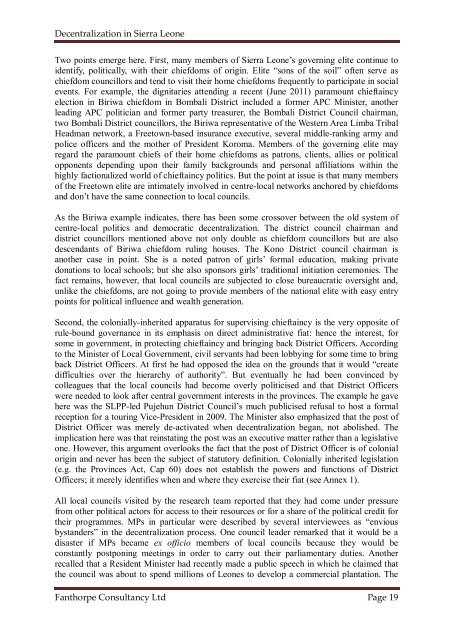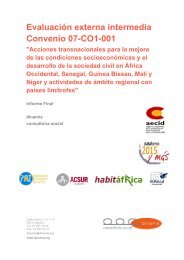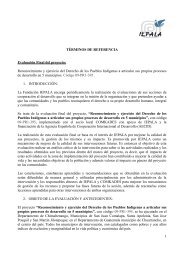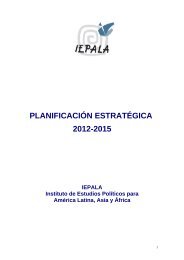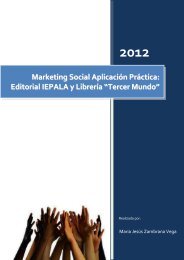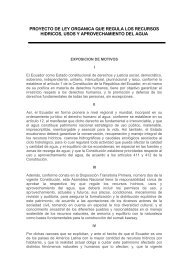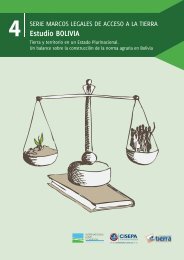Decentralization in Sierra Leone - Research for Development
Decentralization in Sierra Leone - Research for Development
Decentralization in Sierra Leone - Research for Development
You also want an ePaper? Increase the reach of your titles
YUMPU automatically turns print PDFs into web optimized ePapers that Google loves.
<strong>Decentralization</strong> <strong>in</strong> <strong>Sierra</strong> <strong>Leone</strong>Two po<strong>in</strong>ts emerge here. First, many members of <strong>Sierra</strong> <strong>Leone</strong>’s govern<strong>in</strong>g elite cont<strong>in</strong>ue toidentify, politically, with their chiefdoms of orig<strong>in</strong>. Elite “sons of the soil” often serve aschiefdom councillors and tend to visit their home chiefdoms frequently to participate <strong>in</strong> socialevents. For example, the dignitaries attend<strong>in</strong>g a recent (June 2011) paramount chiefta<strong>in</strong>cyelection <strong>in</strong> Biriwa chiefdom <strong>in</strong> Bombali District <strong>in</strong>cluded a <strong>for</strong>mer APC M<strong>in</strong>ister, anotherlead<strong>in</strong>g APC politician and <strong>for</strong>mer party treasurer, the Bombali District Council chairman,two Bombali District councillors, the Biriwa representative of the Western Area Limba TribalHeadman network, a Freetown-based <strong>in</strong>surance executive, several middle-rank<strong>in</strong>g army andpolice officers and the mother of President Koroma. Members of the govern<strong>in</strong>g elite mayregard the paramount chiefs of their home chiefdoms as patrons, clients, allies or politicalopponents depend<strong>in</strong>g upon their family backgrounds and personal affiliations with<strong>in</strong> thehighly factionalized world of chiefta<strong>in</strong>cy politics. But the po<strong>in</strong>t at issue is that many membersof the Freetown elite are <strong>in</strong>timately <strong>in</strong>volved <strong>in</strong> centre-local networks anchored by chiefdomsand don’t have the same connection to local councils.As the Biriwa example <strong>in</strong>dicates, there has been some crossover between the old system ofcentre-local politics and democratic decentralization. The district council chairman anddistrict councillors mentioned above not only double as chiefdom councillors but are alsodescendants of Biriwa chiefdom rul<strong>in</strong>g houses. The Kono District council chairman isanother case <strong>in</strong> po<strong>in</strong>t. She is a noted patron of girls’ <strong>for</strong>mal education, mak<strong>in</strong>g privatedonations to local schools; but she also sponsors girls’ traditional <strong>in</strong>itiation ceremonies. Thefact rema<strong>in</strong>s, however, that local councils are subjected to close bureaucratic oversight and,unlike the chiefdoms, are not go<strong>in</strong>g to provide members of the national elite with easy entrypo<strong>in</strong>ts <strong>for</strong> political <strong>in</strong>fluence and wealth generation.Second, the colonially-<strong>in</strong>herited apparatus <strong>for</strong> supervis<strong>in</strong>g chiefta<strong>in</strong>cy is the very opposite ofrule-bound governance <strong>in</strong> its emphasis on direct adm<strong>in</strong>istrative fiat: hence the <strong>in</strong>terest, <strong>for</strong>some <strong>in</strong> government, <strong>in</strong> protect<strong>in</strong>g chiefta<strong>in</strong>cy and br<strong>in</strong>g<strong>in</strong>g back District Officers. Accord<strong>in</strong>gto the M<strong>in</strong>ister of Local Government, civil servants had been lobby<strong>in</strong>g <strong>for</strong> some time to br<strong>in</strong>gback District Officers. At first he had opposed the idea on the grounds that it would “createdifficulties over the hierarchy of authority”. But eventually he had been conv<strong>in</strong>ced bycolleagues that the local councils had become overly politicised and that District Officerswere needed to look after central government <strong>in</strong>terests <strong>in</strong> the prov<strong>in</strong>ces. The example he gavehere was the SLPP-led Pujehun District Council’s much publicised refusal to host a <strong>for</strong>malreception <strong>for</strong> a tour<strong>in</strong>g Vice-President <strong>in</strong> 2009. The M<strong>in</strong>ister also emphasized that the post ofDistrict Officer was merely de-activated when decentralization began, not abolished. Theimplication here was that re<strong>in</strong>stat<strong>in</strong>g the post was an executive matter rather than a legislativeone. However, this argument overlooks the fact that the post of District Officer is of colonialorig<strong>in</strong> and never has been the subject of statutory def<strong>in</strong>ition. Colonially <strong>in</strong>herited legislation(e.g. the Prov<strong>in</strong>ces Act, Cap 60) does not establish the powers and functions of DistrictOfficers; it merely identifies when and where they exercise their fiat (see Annex 1).All local councils visited by the research team reported that they had come under pressurefrom other political actors <strong>for</strong> access to their resources or <strong>for</strong> a share of the political credit <strong>for</strong>their programmes. MPs <strong>in</strong> particular were described by several <strong>in</strong>terviewees as “enviousbystanders” <strong>in</strong> the decentralization process. One council leader remarked that it would be adisaster if MPs became ex officio members of local councils because they would beconstantly postpon<strong>in</strong>g meet<strong>in</strong>gs <strong>in</strong> order to carry out their parliamentary duties. Anotherrecalled that a Resident M<strong>in</strong>ister had recently made a public speech <strong>in</strong> which he claimed thatthe council was about to spend millions of <strong>Leone</strong>s to develop a commercial plantation. TheFanthorpe Consultancy Ltd Page 19


